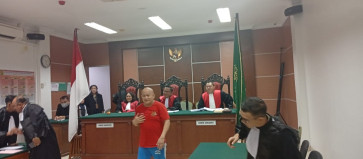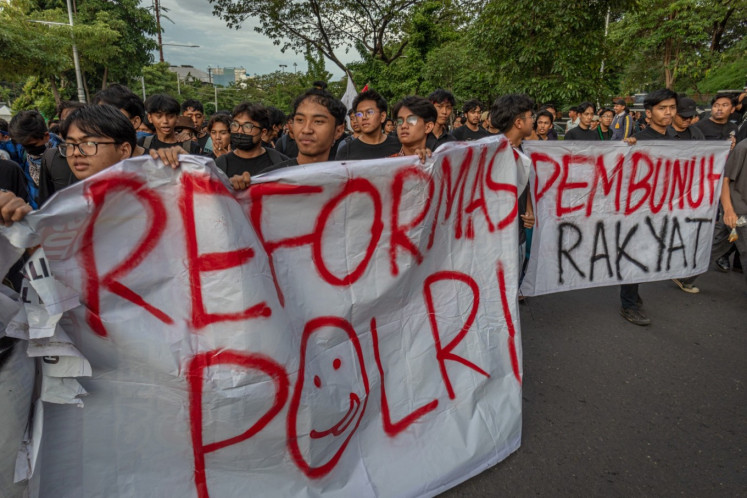Popular Reads
Top Results
Can't find what you're looking for?
View all search resultsPopular Reads
Top Results
Can't find what you're looking for?
View all search resultsLocal smelter business goes awry
The government’s push to spur the domestic mineral processing industry has gone awry as investors struggle to obtain sufficient supplies of raw materials as well as find buyers for intermediary products
Change text size
Gift Premium Articles
to Anyone
T
he government’s push to spur the domestic mineral processing industry has gone awry as investors struggle to obtain sufficient supplies of raw materials as well as find buyers for intermediary products.
The Processing and Smelting Companies Association (AP3I) said at least six of its 22 members frequently faced difficulties in securing raw materials for their smelters locally, forcing them to import mineral ores.
The six investors are nickel smelter operators PT Century Metalindo and PT Cahaya Modern Metal Industri, iron smelter operators PT Meratus Jaya Iron&Steel and PT Delta Prima Steel, manganese plant operator PT Indotama Ferro Alloy and zircon plant operator PT Monokem Surya.
“Delta Prima, for instance, hopes there will be a domestic market obligation to feed its smelter as it turns out there’s not enough raw material supplies to support its facility at present,” AP3I’s head of organizations committee Saptohadi Prayetno said recently.
Consequently, he expected the government to pay more attention to independent smelter operators who do not have their own mines, so that they could secure feedstock for their operations.
Saptohadi also suggested that it implement a moratorium on the development of nickel smelters in the country, especially considering investors’ ever-growing appetite to build such facilities lately, amid concerns over raw materials.
As of 2017, 13 nickel smelters are operating in the country with a total processing capacity of 34.9 million tons of ores, according to official data.
Previously, two smelters had halted their operations, primarily because of the bloated price of coking coal.
A number of investors have also committed to constructing another 14 nickel smelters worth US$4.3 billion with a combined input capacity of 28.53 million tons of ores, raising further concerns over the adequacy of local nickel supplies for entire facilities.
Saptohadi further underlined the urgency of calculating how many nickel smelters are needed in the country, particularly without reliable mineral reserves data available. “Don’t let investors see their businesses die after they disburse a huge amount of money in the country,” he said.
Earlier, the Energy and Mineral Resources Ministry’s mineral and coal director general Bambang Gatot Ariyono claimed that domestic nickel reserves would not be depleted until 2125 and therefore there was no reason to worry.
As of 2016, domestic measured nickel resources stood at 1.43 billion tons, while proven nickel reserves stood at 238.64 million tons.
I Made Dana Tangkas, head of the permanent committee for metal, machinery and transportation equipment at the Chamber of Commerce and Industry (Kadin), said the success of the downstream industry’s development would be measured by the absorption of semi-proceesed mineral products domestically by the metal-based industry, such as the base-metal industrial sector, which Indonesia still lacked.
“Without the growth of a metal-based manufacturing industry, the development of a mineral downstream industry will not bring higher added value,” he said.
I Made Edy Suryana, the head of mineral business monitoring at the Energy and Mineral Resources Ministry, acknowledged such a problem, pointing out that nearly all of the semi-processed mineral products such as alumina and ferronickel, key materials used to produce aluminum and stainless steel respectively, had been exported because of low local absorption.
“There is a gap between the smelting industry and the downstream industry. That’s what we should develop,” Suryana said, referring to the midstream industry.
Indonesia currently has 53 processing and refining facilities, 29 of which are tin smelters and 15 of which are nickel smelters, according to data from the Energy and Mineral Resources Ministry. Meanwhile, there are also 27 new smelter projects in the pipeline, including 14 nickel and six bauxite smelters.










